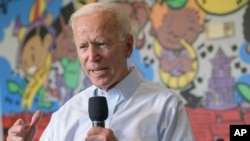Former Vice President Joe Biden unveiled a plan on Tuesday to reform the U.S. criminal justice system by lowering incarceration rates, ending the federal death penalty and eliminating racial disparities in how people are sentenced.
Biden, the Democratic front-runner in the party's nominating contest to take on Republican President Donald Trump in next year's election, has faced criticism over his support for a 1994 crime bill that some say contributed to mass incarceration, especially of black men.
That bill, signed into law by former Democratic President Bill Clinton when Biden was a U.S. senator, greatly increased funding for the construction of new federal prisons and included a 'three strikes' provision, which required a mandatory life sentence for a person guilty of committing a severe, violent felony after two previous convictions.
On the campaign trail, Biden has said the 1994 law did not contribute to mass incarceration.
Studies show that incarceration rates steadily increased in the United States from the early 1970s to around 2010, and the 1994 bill was just part of the "tough on crime" movement of that era which led to more prison sentences.
Under Biden's new plan, he would aim to reduce the U.S. prison population, in part by ending the jailing of people solely for drug use offenses. He would also create a $20 billion grant program to incentivize states to shift their focus from jailing people to preventing crime.
Biden, 76, supported the death penalty for decades and the 1994 crime bill made additional offenses punishable by death.
Under his new proposal, Biden calls for scrapping the death penalty at the federal level, and spurring states to follow the federal government's example by sentencing people to life without parole, rather than executing them.
One of Biden's rivals for the Democratic presidential nomination, U.S. Senator Kamala Harris from California, has criticized Biden over his support for the 1994 crime bill. In the first televised Democratic debate last month, she also attacked Biden over recent remarks he made defending his work with former segregationist senators.
Biden and Harris will share the stage again in another nationally televised debate next week.
"People are going to weaponize his service in Congress against him," a senior Biden campaign official said. "He is not going to allow his record to be mischaracterized. This plan is a true reflection of what he believes: he believes in second chances."
The plan would also end the disparity between sentences for crack and powder cocaine, which have been viewed as racially biased and unfair.
It would decriminalize the use of cannabis and expunge all prior cannabis use convictions. Harris is set to introduce a Senate bill on Tuesday to enact legislation on similar lines.
Biden will also seek to end racial disparities in the criminal justice system, including providing greater access to quality public defenders, ending mandatory minimum sentences, and scrapping the cash bail system, which Biden described as "the modern-day debtors' prison."





